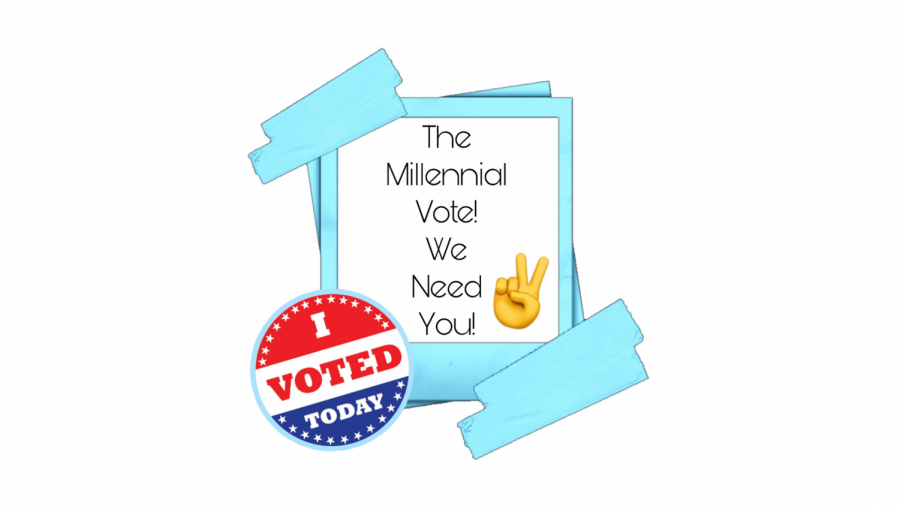New Generation Voting For The Future
Why Voting Or Registering To Vote Matters For the Generation Now
New candidates hoping to win the newest generation of voters.
March 12, 2020
Nowadays, young people neglect the importance of registering to vote, not realizing that their voice is key to the future. Issues discussed during the elections could use a shift in perspective, especially since millennials are advocating for issues that strongly need their influence.
Young voters account for almost half of the voting population, making them an extremely powerful political force. While young voter participation in 2016 declined by 2% from a record 52% at the 2008 election [brookings.edu], today the voting population includes almost equal parts millennials [1980-94] and baby boomers. As the boomer electorate decreases in size, experts suggest it is merely a matter of time before millennials become the largest and most powerful group driving future elections in the U.S. Unfortunately, not all who can vote will, meaning that fewer young people get to directly influence issues that might affect their lives for years to come, including college tuition reform and federal job programs.
While young people do make up a large portion of the voting-eligible population, they are much less likely than those who are older to get out and vote. In 2016, only 19% of people aged 18-29 cast their ballot in the presidential election and at 49%, 45-64-year-olds were accounted for the largest electorate last year [college.usatoday.com].
Senior Ciari Rodriguez, who plans to register to vote when it is time, says, “ Their vote has a lot to do with the results at the end, like that one vote could make a difference.” Rodriguez commented she would vote for the issues being addressed, not just the candidate because she wants to vote for someone who will fight for issues she believes in.
There have been a few reports that have attributed to the outcome of the election to a “missed opportunity” on the part of millennials to affect change: while the majority of young voters actually cast ballots for Hillary Clinton, their low turnout was not enough to counter the ballots of older voters. Due to this, researchers are increasingly interested in methods of successfully mobilizing young voter groups. Schools such as Duke University recently initiated an innovative project designing policy reform to increase turnout among the youth.
Many young people feel as though their vote does not count which is their reason for not participating in elections. Millennials reported feeling disillusioned by both presidential candidates before the election in 2016, and chose to sit out altogether as a result. In a divided America, perhaps more than ever, every vote counts, especially those from one of the country’s largest voting groups.
Contrary to Rodriguez’s stance, senior Lis Sharaxhiu shares his take on the vote, feeling his vote in the future would not impact an election, saying, “In previous elections, the popular vote or the majority population vote doesn’t matter. It just matters about the electoral vote.”
President Barack Obama’s election in 2008 is an example of this theory in motion, as his popularity with youth voters was one of the key elements of his campaign, giving him a large margin over competitors in a number of strategic states. Other elections in recent years have come down to just a few votes (Minnesota senator Al Franken won by just 312 votes in 2009 as one example), proving our vote does matter, maybe more than we realize.
In today’s advanced world, there is no excuse not to vote because we do not know enough about the candidates. In fact, one might find it harder to escape day-to-day political news than subscribe to it. Living in an era in which Twitter is a preferred means of communication for the current President of the United States– Instagram, YouTube, and Snapchat have become as crucial as the candidates’ own websites for distributing information about relevant issues. As this type of civic education in everything is typical for most Americans today, it is beneficial in the months leading up the election but also on a day-to-day basis. In our current online climate, it helps allow young voters to create a clearer picture of the candidates and their platforms in a medium they are familiar with.
Some millennials may feel that choosing a president or a senator just is not something that affects your life right now. They might not yet be struggling with issues like college debt or finding a full-time job. For many millennials, adulthood brings many new challenges– like college, marriage, buying a house, paying for your own health insurance, or perhaps starting a business, all of which could severely change your perspective on political issues.
While we cannot predict who or where you will be in four years, we can be sure that the officials elected into office and the policies they implement will impact our life in the coming months and years. Why not have a say? Speak up, make a choice, and take part in the election to protect your interests in your first few years in the real world.



